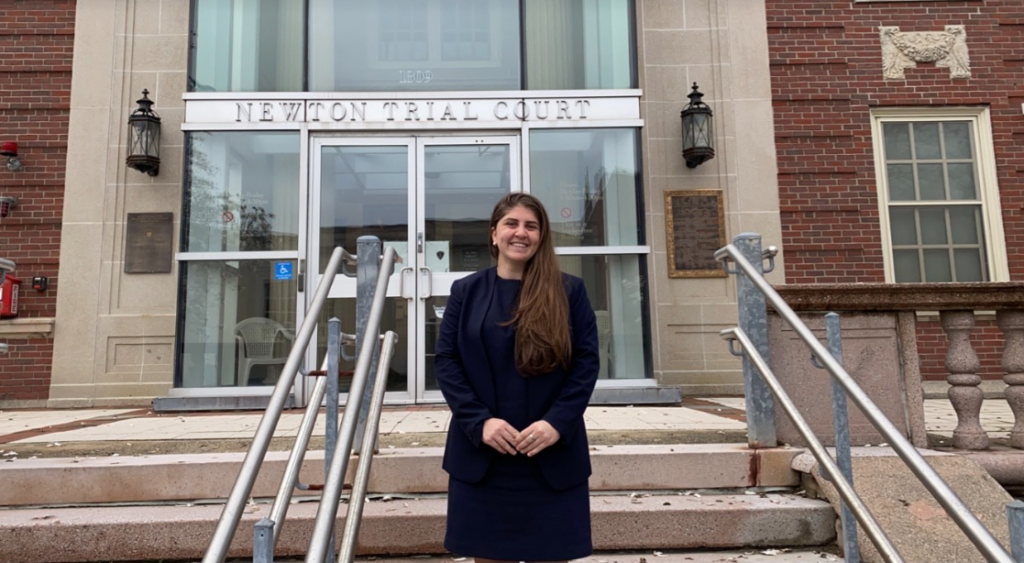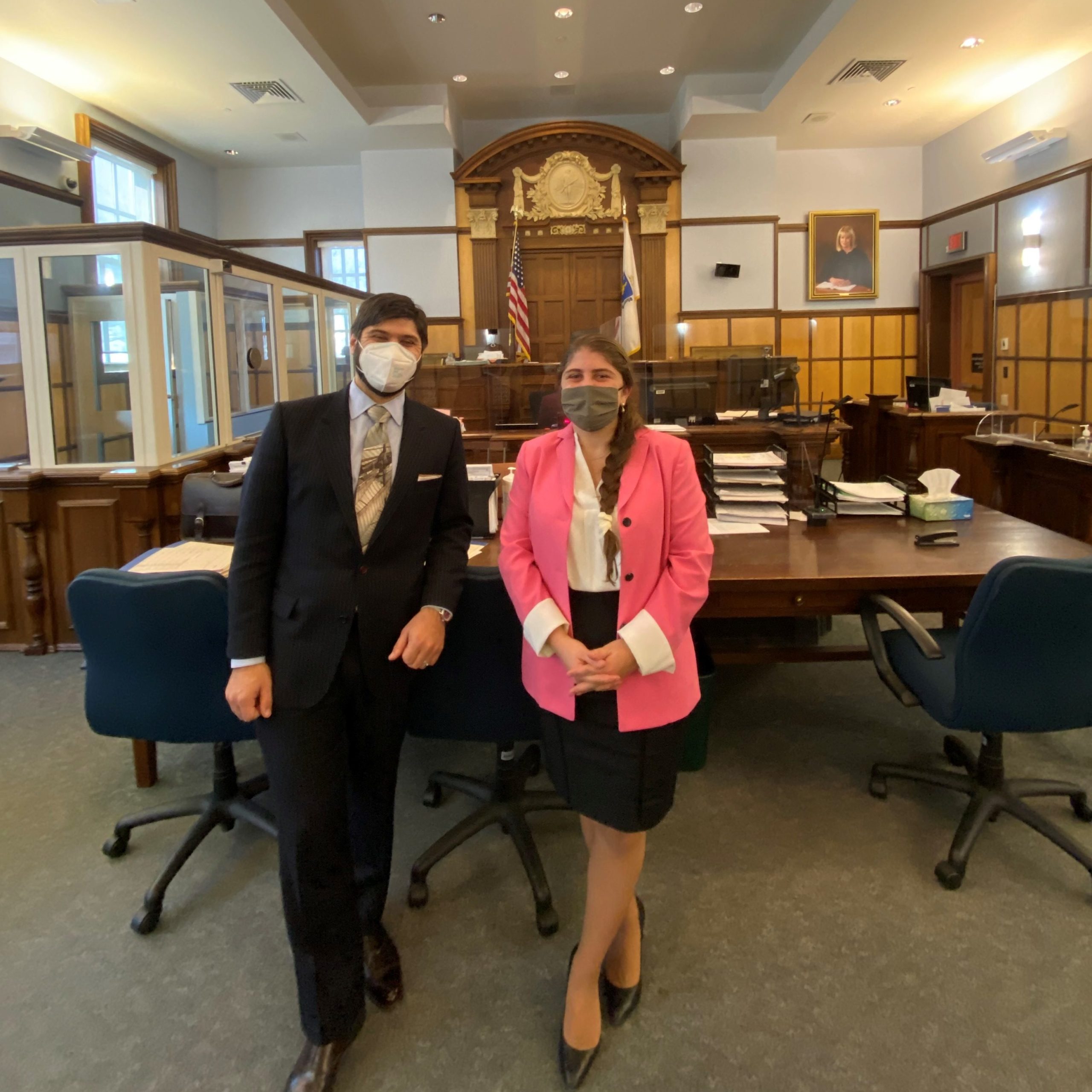By Anoush Baghdassarian, J.D. ’22
I came to law school because I believed in the law as a tool for justice. More specifically, I believed in the law as a vehicle for truth. I wrote as much in my personal statement to Harvard Law School:
“When I began my human rights work, I saw the potential of law to combat denial. The past two years have further crystallized for me the importance of the law, this time for its ability to reconcile more nuanced conflicting realities. Interviewing more than 100 Syrian refugees has made me more attuned to the challenge of triangulating the validity of multiple narratives. … I wonder whether law can reconcile these contradictions in ways that avoid denying any side of the complex truth.”
Three years and many courtrooms, classrooms, and clinics later, I am convinced it can. I come from a community where ‘an acknowledgement of the truth’ is something we have sought for over one hundred years, and that can be achieved through both retributive and restorative justice means. Those who perpetrated a genocide against us deny it, and in doing so, they deny us our dignity and humanity; when I applied to law school, I believed ‘law’ could help redress those wounds and restore that dignity. Fittingly, when I wrote my personal statement, I wrote about ‘the law’ as the agent for change, the agent that could help reconcile conflicting realities, but only now do I realize that’s not entirely precise; only now can I see the agency within the lawyer to wield the law as that tool for good. Only after preparing my own trials for the Prosecution Clinic could I see the lawyer’s role and agency in effectuating justice. The decisions I make, to champion a narrative, to highlight certain facts, or to approach the other side collegially and honestly versus antagonistically and defensively, can all affect the outcome of justice. Of course I knew lawyers played a role in the equation for truth and justice, but what it looked like and the extent of it is something I have only been able to appreciate through practice, and this is surely just scratching the surface.
My time in the Criminal Prosecution Clinic helped me reach this conclusion. Although I came to law school to learn how to combat impunity for atrocity crimes: genocide, war crimes, and crimes against humanity, the lessons I learned in the Prosecution Clinic about ethical prosecution at the local level as a prerequisite for truth and justice translate to that field as well.
I signed up for the Prosecution Clinic because I wanted practice standing up before a judge, making legal arguments, practicing my persuasive rhetoric, and presenting complex evidence in a clear, simple, and convincing way to a jury. I figured that it might take years for me to reach that point in my preferred field of practice since the cases take years to build and try, so I thought I might practice these skills in a fast-paced setting like the District Attorney’s Office. However, my experience in the clinic taught me so much more than just these skills. Through observation, practice, and reflection, it taught me about the weight of the responsibility a prosecutor has, and how to carry that weight ethically. I learned that doing so is a precondition for justice.
In my time at the District Attorney’s Office, I did arraignments, argued motions to dismiss, wrote motions to suppress, engaged in plea discussions with defense attorneys, read plea agreements into the record after defendants pleaded to sufficient facts, prepared witnesses and officers for trial, second seated a jury trial, and even had my own jury trial. I prepared opening, direct, cross, and closing arguments for a variety of cases. I went to the scene of the incident for each instance, as per Professor Corrigan’s suggestion, to better understand what took place. I worked with victim witness advocates and sat in on interviews with victims who were going to testify in an upcoming trial. I learned about jury selection, sentencing, plea bargaining, diversion programs, being prepared to answer a judge’s question, and so much more, both in the office and through the complementary classes in the seminar part of the clinic.
In addition to learning through practice, I learned from wonderful supervisors whose patience and generosity helped make sense of everything that was happening so speedily around me. Working at the district attorney’s office felt like a trial by fire, at least at the beginning, constantly unsure what to do, or whether I was doing it right, and leaning tremendously on those supervisors who were willing to answer my questions and help reassure me that I was doing alright. I learned a lot from the clinical instructor, Professor Corrigan, and clinical supervisor, Nathaniel Stetson. I have a list of 15 take-away bullets that I printed for myself after the clinic’s end with the high-level lessons they jointly taught me. Beyond the 15 bullet points, there are some things that couldn’t be captured on paper; intangible lessons they taught me that were evidenced in their interactions with others: defense attorneys, defendants, victims, victim witness advocates, judges, clerks, police officers, police prosecutors, clerk magistrates, and more. It was a commitment to the truth that was clear in their fairness, their understanding, their cordiality, and their honesty. I have been told more than once by them both and by others that there really is no winning or losing when it comes to this work–it’s not as adversarial as everyone makes it out to be. A guilty verdict is not a ‘win,’ rather, ‘winning’ is when you adhere to your duty to the truth.
On my last day in the office I had my first jury trial. I was nervous, excited, and spent the prior nights preparing. I prepped all my direct examinations, and opening and closing statements, and prepared some questions for cross examination in case the defendant took the stand, which I learned rarely happens. She did. When I got to the courthouse I met with the officers and handed them copies of their report from two years ago (jury trials were backed up due to Covid-19). I talked to them for a bit and we then went into the courtroom. I handed the clerk my Crayton motion and we went through the motions in limine. I then read the facts of the plea agreement for the first charge into the record after the defendant admitted to sufficient facts.
We then began the process of selecting the jury for the second charge, to which the defendant was pleading not guilty. Before I knew it, it was time for opening statements. The only other time I had done this was in the Trial Advocacy Workshop, but this time it was real. The entire trial felt like an 8-hour cold call; every question I asked and statement I made was marred with a first-time-trial nervous energy that I’m sure was palpable throughout the courtroom. With all the inputs and outputs happening at once, there was nothing else I could be but genuine. Anything I had learned or practiced or tried to memorize or emulate that had not become muscle memory was gone, and the only thing I could really hold on to was that which I felt was true. I was grateful in that moment to have had the clinical role models I did because the lessons I had learned about ethical prosecution and a duty to the truth guided me that day.
Overall, my clinical experiences at HLS, including the Prosecution Clinic, taught me how to put the law into practice in more ways than one. They solidified for me what I had learned in 1L and taught me how to use my newly-minted familiarity with jurisprudence and legal research and writing to begin helping the communities I came to law school to help. I remember the first time I got excited about Westlaw was in the Government Lawyer clinic when I had to find an answer for my supervisor in the U.S. Attorney’s Office for an upcoming hearing. It was the first time my domestic legal research actually felt like it meant something, or had real consequences, and it was empowering. I remember the all-nighters I pulled poring over the hundreds of pages of transcripts from The Gambia’s Truth, Reconciliation, and Reparations Commission for a team effort in the International Human Rights Clinic seeking accountability for grave abuses. It was the first time I saw what it meant to have facts meet legal standards and definitions, and an important exercise in creative lawyering when limited jurisdictional avenues exist. I remember the nervousness with which I proceeded through my first jury trial for the prosecution clinic… It was the first time I felt firsthand the enormous responsibility that accompanies prosecution and the height of the standard, ‘beyond a reasonable doubt.’ Each hands-on experience I’ve had, including most recently the prosecution clinic has taught me, above all, the ability of the law to be used for good. The law is a tool that can be wielded to both help and hurt people and I hope that the more people who embark on a legal career to learn how to use the law for good, the more effective a tool it will become to do that.
Filed in: Clinical Student Voices
Contact Office of Clinical and Pro Bono Programs
Website:
hls.harvard.edu/clinics
Email:
clinical@law.harvard.edu

